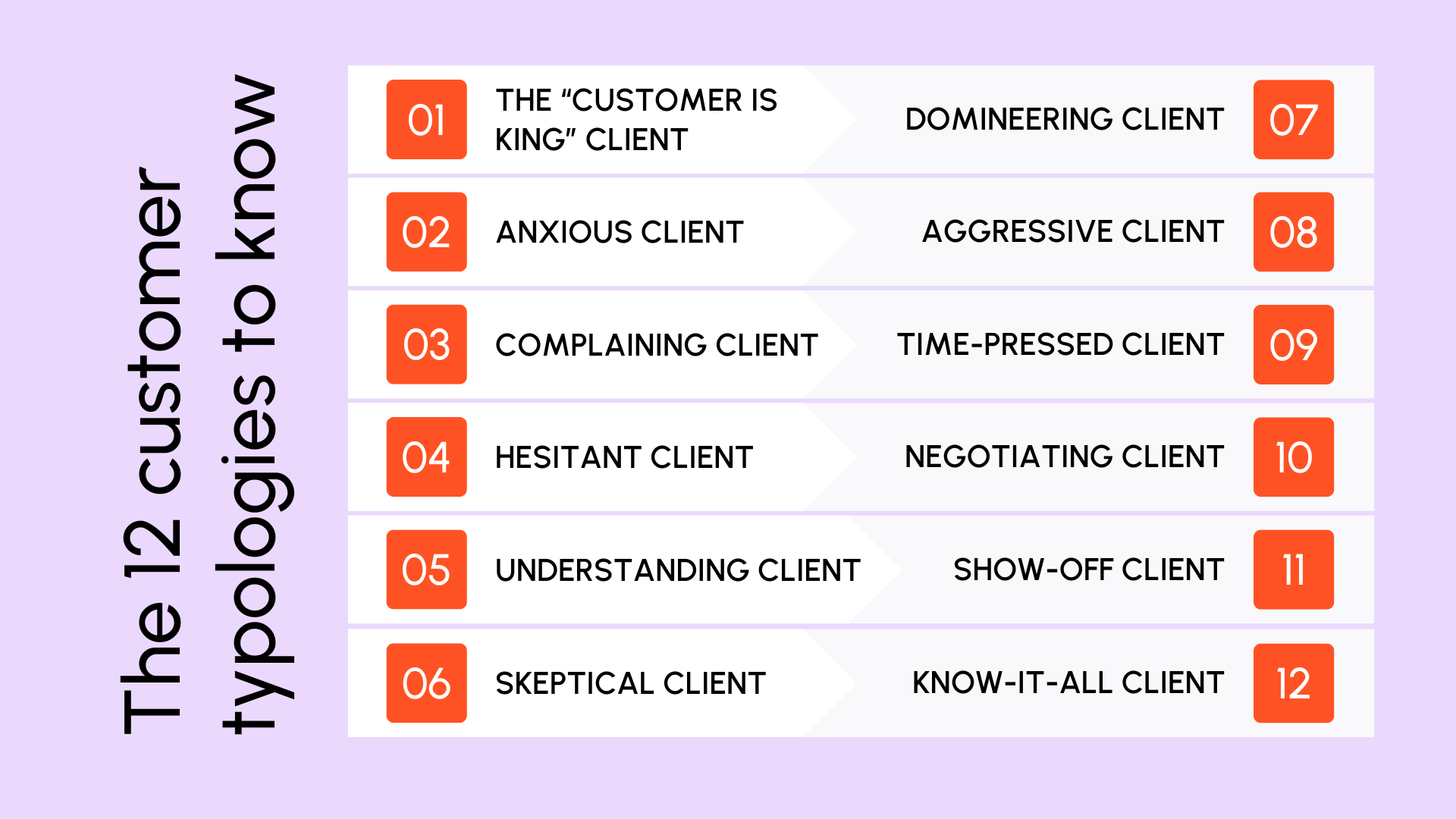How does customer typology optimize sales?
Understanding customer typology is fundamental for any business looking to refine its sales strategy and optimize performance. The goal here is to demonstrate how customer typologies can transform sales interactions (whether with prospects or existing customers) and final results. Whether you're an entrepreneur, marketing professional, sales professional, or simply curious about consumer behavior, understanding different customer typologies reveals unique opportunities to improve retention, reduce dissatisfaction risks, and boost sales metrics. So let's dive into this world together to discover how customer typology can become a success driver for your business.
Expert opinion
When discussing customer typology, it's valuable to adopt an advanced segmentation method based on behavioral and psychographic data, in addition to traditional demographic data.
Most companies settle for segmenting their customer base based on criteria like age, gender, and geography. However, these methods are often insufficient to understand the deep motivations that drive customers to purchase a product or engage with a brand.
By incorporating behavioral data (such as purchasing habits or online interactions) and psychographic data (values, attitudes, interests), you can create much more nuanced customer profiles. This will allow you to adapt your communication, products, and even your after-sales service much more precisely.
Why Is Understanding Customer Typologies Important?
Defining Customer Types, But Why?
Whatever service or product you want to sell, every purchase is preceded by an exchange.
To establish a trusting relationship between two individuals, the best approach is knowing how to listen actively. The salesperson must engage in active listening to respond to their prospect's questions. They must also adapt their communication style to their counterpart.
Here's proof by example: you wouldn't communicate the same way with a 14-year-old as you would with a 35-year-old father. Lifestyles, concerns, and consumption habits differ, and this must be taken into account.
To succeed in a sale, every salesperson must make the effort to understand how the person across from them operates. However, this exercise isn't always simple. Some customers are easier to approach than others.
Fortunately, tools exist. We're talking about customer typology here. This involves identifying different groups of customers who have similar purchasing behaviors.
Understanding existing customer typologies allows you to choose the right strategy for crafting your sales pitch and preparing before a sales meeting.
Thus, with knowledge of customer typologies, a salesperson can adopt:
- Better communication: adapting the tone of their speech, format, or vocabulary to use
- Their sales pitch in which they'll highlight elements that will resonate based on customer typology (for example, discussing price, product benefits, etc.)
Better Knowing Your Customers to Be a Better Seller
We've seen this before: not all potential customers of a business have the same characteristics. Age, professional experience, life path, or profession can all influence how a prospect behaves.
A company can therefore define its own customer typology using precise marketing studies. This is particularly the case when focusing on company personas.
Fortunately, salespeople and companies can also rely on experience gained in sales techniques and marketing strategy. We've known for decades that when you want to sell, you very often face one of 12 typical customer profiles. For example, the king customer or the anxious customer.
Having knowledge of customer typology that exists allows salespeople to better prepare their sales arguments. The more a seller knows the specificities of a customer typology, the more they increase their chances of successful sales.
Classification: The 12 Customer Typologies to Know
Each customer typology presents unique challenges and opportunities for your business. The objective is to know and understand these different profiles to better respond to their needs and expectations.
The King Customer
Everyone has heard of the king customer. They're often feared because they display great self-confidence and determination.
They're often very demanding and consider that their shopping experience should be perfect. We can't really blame them for that.
Since they expect impeccable service/product, the king customer may tend to be directive: "I'm available from 2 PM to 4 PM for our meeting"; "I expect your quote within the week," etc.
So how do you succeed in your sales approach with a king customer?
- A demanding person needs all your attention and listening: show them you know your product perfectly and offer your best service
- Every element of your pitch must be proven to avoid creating frustration with this customer
- To avoid any overflow, especially in service sales, clearly define the legal aspect with precise Terms and Conditions
The Anxious Customer
We can define the anxious customer as someone who's simply afraid of making a mistake. For example, if it's a B2B purchase, this customer doesn't want to be responsible for a purchase that would be useless within their company.
They're easily recognizable: the sign of their anxiety translates into a tendency to ask many questions. Most importantly, they imagine the worst. The anxious customer may distrust marketing pitches: they therefore seek to test the seller by confronting them with complex questions. For example: "If this option doesn't work, what have you planned?" etc.
To properly anticipate a meeting with an anxious customer:
- Take time to detect everything that could worry a hesitant person
- Adopt a warm tone and be available to answer all possible questions
- Be transparent about all stages of upcoming collaboration
- Show or provide testimonials from satisfied customers, particularly compelling references to reassure them
The Complainer Customer
The complainer customer doesn't like being solicited or listening to any sales pitch.
It's simple—for them, everything was better before. Consumer society doesn't bring anything good.
This customer typology likes to criticize and stands out with negative speech and terms. They could be quite destabilizing with phrases like "I've known the sector for over ten years," "I don't like salespeople."
What sales temperament should you adopt in this case?
- Listen and don't try to prove they're wrong
- Offer an original solution, plan a special offer for them: this customer must feel they're unique
The Hesitant Customer
The indecisive customer is, by definition, always in doubt. They don't know exactly what they need and hesitate when consulting the different offers available to them.
Sales with this type of customer are often lengthy because you need to cover all options and present each characteristic.
To properly prepare a sale with an indecisive customer, the salesperson must show patience. You must understand that decision-making can prove to be real torture for the customer.
To be as relevant as possible with a hesitant customer, you should:
- Guide the customer, ask them relevant questions and make them aware they really need to go through you
- To properly define their needs, use open-ended funnel questioning: generic questions first, then more precise ones
- You can present refund or cancellation possibilities to reassure them: they'll be less afraid to make a decision
- Present a speech full of solutions to provide the security they need to make a choice
The Understanding Customer
The understanding customer is the customer it's very pleasant to work with. They're the ideal customer! Some of their qualities are visible from the first exchanges: they're positive, empathetic, and very inclined to discussion.
For a salesperson, this is a customer they'd like to negotiate with as often as possible. They express understanding or regularly agree with your arguments. Be careful though—the challenge would be being too flexible with them, risking disappointment.
If the understanding customer offers their trust to a company, you must not betray it.
How do you succeed in a sale with this customer typology?
- Listen to them, of course
- Make them comfortable to create a pleasant and trusting relationship: an understanding customer has every chance of becoming a loyal customer
- Prepare your pitch precisely to present everything they need to know
The Distrustful Customer
The distrustful buyer is a person who's difficult to convince. When they need to make a purchase, they need concrete proof. Very meticulous and attentive to all details, the distrustful customer will be inflexible with the figures you give them.
Distrustful customers may tend to change their minds quickly if one point in your pitch lacks precision.
To communicate well with this customer typology, you should have a very precise pitch and arguments you master completely to find a solution to their problem (offer conditions, pricing, deadlines, etc.).
The best things to do to succeed in an interview with a distrustful customer:
- As you'll understand, you need to be precise and confident during your sales exchange
- Throughout the sales experience, document each of your meetings with figures and proof of your operation's success
- Be demonstrative by coupling your arguments with examples of customer successes
The Authoritative or Dominant Customer
The authoritative customer typology stands out through their voice tone and very cold speech. They'll seek to destabilize you: they have no time, no budget, yet seek to maximize their investment.
You'll understand—encountering an authoritative customer during a discovery call will be particularly complicated. Even for a seasoned salesperson.
To interest an authoritative customer, you must therefore be firm and above all... Creative!
Some leads for interesting an authoritative customer:
- Don't impose anything on your customer and give them freedom to make suggestions—this will give them the impression of controlling the exchange
- Be straight to the point and creative in how you approach your arguments
- Redouble attention to understand their needs
The Aggressive Customer
The aggressive customer has a sharp tongue. This customer typology doesn't stand out for listening skills: on the contrary, they're quite stubborn in their ideas. They could easily cancel a sale or request a refund if what they get isn't up to the sales pitch they were given.
For a seller, be careful not to promise the moon to this type of customer! Here's how you should proceed with them:
- Don't try to respond to their threats, keep your cool
- Take it upon yourself not to respond when they criticize aggressively
- Prepare your meeting well and give them concrete solutions to their needs
- To ensure everything goes well and prevent them from reproaching you for something after the sale, be sure to restate their request
The Rushed Customer
The rushed customer doesn't dwell on details: they have a need and seek a quick response. The most rigorous and dynamic salespeople will be best positioned to sell to this clientele.
Faced with this type of customer's impatience, the seller must make the effort to get straight to the point and especially respond to their requests quickly.
From a sales perspective, you can act this way:
- Prepare a straight-to-the-point and precise pitch
- Faced with a customer who has no problem making decisions quickly, don't hesitate to offer complementary products
- Be quick and attentive so your customer feels understood in their need for urgency
The Negotiator Customer
The economical or negotiator customer is characterized by someone who seeks to save money. They're constantly looking for the best deals, discounts, or low prices—it's their operating mode. They like having negotiation room on all quotes because they like feeling like winners in an exchange.
In fact, this customer typology knows the price of services and products that interest them well. You should therefore not be caught off guard by their reactions when announcing pricing.
Often, regardless of the argument deployed, the argument that will hit home will be the best price. Make sure you have the right one.
How to act with this customer?
- Take a listening stance and advance concrete arguments
- Highlight your offer's or product's quality compared to competitors: the negotiator customer likes knowing results and benefits of what they buy
- Nothing beats a promotion to finish convincing this type of customer
The Show-off Customer
The show-off customer loves novelty and the latest innovations and trends. You recognize them by their rather technical speech: they like researching products and services before making a purchase. They're looking for what's trendy, or what will be trendy.
With this customer typology, price isn't necessarily a discussion topic, as long as they're aware they're buying the best.
What you should do with them:
- Talk about your service or product by showing its qualities and innovative/unique character
- Be enthusiastic and dynamic
- Emphasize the image benefits the customer can gain by making this purchase
The Know-It-All Customer
The know-it-all customer is identifiable by their very confident speech. Their opinion is definitive—they know exactly what they need. Moreover, this type of customer doesn't necessarily listen to what you tell them.
To guide a know-it-all customer, you must first give them space to express themselves.
What sales temperament should you have?
- Be convincing and provide tangible proof of success or product/service functionality
- Let the customer think and answer all their questions
- Provide precise comparison elements: the know-it-all needs concrete answers
You can deepen the subject of customer profiles by exploring the SONCAS sales method, which describes 7 more precise psychological profiles that can greatly help you understand your prospects and their sensitivities.

How to Identify and Apply Different Customer Typologies?
Analysis Tools for Defining Customer Typology
To determine your customers' typology, various analysis tools can be used. Market research is a traditional and effective tool that allows collecting qualitative and quantitative data about your customers. This can include surveys, interviews, or focus groups to better understand your customers' motivations, behaviors, and preferences.
Advanced technologies also offer valuable opportunities for defining customer typology. For example, customer database analysis can be used to identify purchasing behavior, navigation, or interaction patterns with the company. Customer analysis tools such as Customer Relationship Management (CRM) and Data Mining are particularly useful for collecting and analyzing this information.
Artificial Intelligence (AI) and Machine Learning are also increasingly used to automate and improve customer data analysis. They can help identify customer segments based on various factors, including purchase history, browsing behavior, customer service interactions, and much more.
Finally, market segmentation is a key tool for establishing your customer typology. It involves dividing your target market into homogeneous groups according to various criteria, such as age, gender, income level, consumption habits, or preferences. This approach allows creating personas, which are semi-fictional representations of your ideal customers based on your market and analysis data.
.png)
Concrete Application Examples: Marketing Focus
To illustrate customer typology applications in marketing, let's take some concrete examples.
First, applying customer typology in digital marketing: by using data collected on their customers' online behavior, companies can personalize their digital advertising campaigns for each customer segment.
- For example, customers who spend a lot of time consulting specific products on a website may receive targeted ads for these products on social media.
Next, customer journey optimization: by understanding different motivations and purchasing behaviors of each customer typology, companies can adapt their customer journey to meet each group's specific needs.
- For example, an indecisive customer might benefit from more personalized support, while a rushed customer might prefer a quick, frictionless purchasing process.
Finally, product offer personalization: customer typologies can also help develop custom products or services for each segment.
- For example, a show-off customer might be interested in a limited or exclusive edition of a product, while an economical customer might be more sensitive to a good value-for-money offer.
Customer Typologies Summary
What Are the Different Types of Customer Typology?
Customer typologies can be classified into several categories based on their behaviors and expectations, such as the king customer, anxious customer, complainer, hesitant, understanding, distrustful, authoritative, aggressive, rushed, negotiator, show-off, and know-it-all. Each type reacts differently and requires an adapted approach.
How to Know Your Typical Clientele?
To know your typical clientele, use market analysis tools like surveys, focus groups, and customer behavior data analysis available through CRM systems or Data Mining. Observing customer interactions with your company and listening to their feedback are also essential for precisely defining your clientele's different typologies.
How to Manage Customer Typologies?
It's obvious: it's impossible to approach a sale the same way for all customers. The 12 customer typologies provide a range of the most common profiles encountered during sales. To properly manage customer typologies, draw inspiration from the advice we give in this article.







